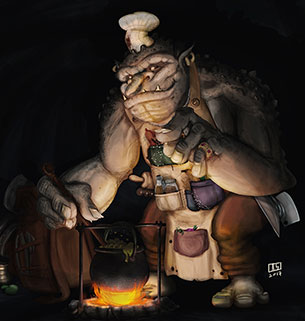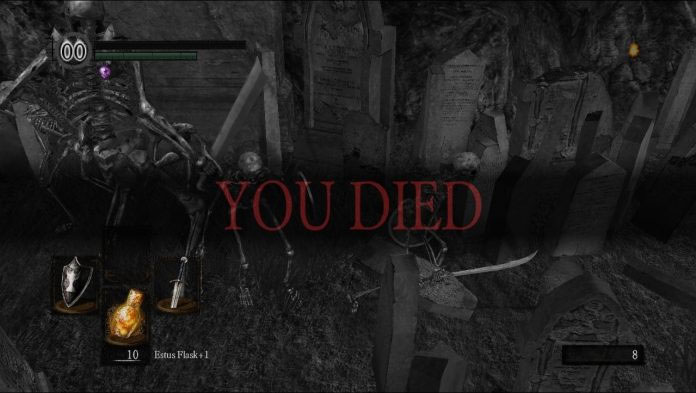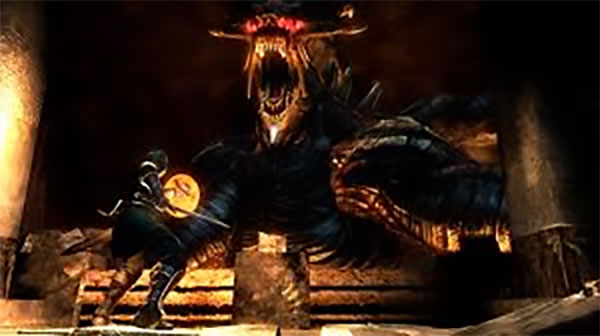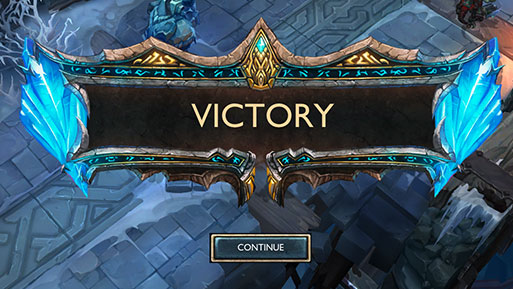The myth of the adversarial DM
With the rise of D&D shows has also come the rise of the buddy DM. Step one of every buddy DM is to lambaste his ancient foe: the adversarial DM. They paint a picture that you have to spoil your players to engage them, and constantly make them feel like heroes! That's what D&D is about, right? Feeling like you're a hero that accomplished something meaningful. Yet when people talk of “adversarial” DMs they usually mean “cheating” DMs, who put the party up against impossible odds and expect the players to do what they want. How can a player feel accomplished in a game like that?
What sessions do players talk about? The ones they barely won against overwhelming odds. The near TPK (total party kill) where one player pulls it out in the end and becomes a hero to the group. You can't create these moments artificially, people can figure out when you're going easy on them even if they don't say it. There are no high points of success without the low points of failure.

Buddy DMs are boring. They might be okay for a brand new player while everything is new and exciting, but once you've played a couple times you see the pattern: so long as you do what the buddy DM expects (and sometimes no matter what you do), experience and magic items will fall from the sky into your lap. You're never threatened, never challenged. If the DM “screws up” and makes a fight too hard, magically their rolls become terrible and the monsters become stupid. Your choices don't matter because they all lead to good outcomes.
Does the buddy DM even have choices that lead to negative consequences? That's the question some players will ask, trying to be as disruptive and suicidal as possible to see if anything bad will actually happen. When players just do whatever without thinking of the consequences they think you're a buddy DM, and if you don't punish them for it you're just confirming their suspicion.
People enjoy rewards more the harder they have to work for them, videogames already use this. Why do brutal, unforgiving, and even unfair games keep going viral? Dark Souls, Cuphead, Getting Over It, what separates these games from others, a great cutscene at the end? Honestly, most endings in games are disappointing but that also doesn't matter because it's the road of trials leading up to that reward that really matters to players. We are wired on a primitive level to enjoy things more if we work hard on them, otherwise who could love that simple lean-to covered in leaves you spent all day building? The fact that your hands are sore from ripping up branches all day enhances your satisfaction with the end result.
Challenge excites us, not reward. Clicker and idle games where you don't have to try and get rewards will trick your monkey brain into playing for a while, but eventually everyone reaches this conclusion: why am I playing this? I'm not actually doing anything, just watching numbers go up forever. Instead of quitting with a sense of pride at the victory screen, it's more like slinking away in shame from a game that gives you what you thought you wanted.

Players engage more when it's hard. When they learn that their actions have logical consequences and that the world moves on without them then they feel, unlike in every other game, that their choices actually matter.
Ever wonder why your players are a well-oiled machine in combat and complete idiots outside of it? Because they treat D&D like a videogame. Most videogames can only make challenging and meaningful situations when in a structured environment like combat. Outside of that is a mostly linear experience where your choices are Yes/No and both lead to the same place. Levels consist of straight corridors leading to the next combat arena.
If that's what your players are used to then that's how they'll treat all situations that aren't combat, an ultimately meaningless corridor leading them to the next fight. Even if your players are “heavy RP” that probably means they've just come to enjoy the pointless free-form time spent out of combat as an opportunity to banter. The benefit of D&D is that it attempts to simulate a world, with actions and consequences for every activity. Once your players realize non-fight time is still important decision time, they'll adapt.
The DM SHOULD be trying to kill the players, because the rules are heavily stacked in the player's favor, and if the DM is following all the rules they will have a pretty hard time succeeding. Nobody wants to fight an enemy that just lies down and gives up. The enemies in your game are trying their hardest to succeed, same as the players, and your enemies will often have home field advantage since the players barged in and started killing them.
Look at things from the perspective of the lowly goblin, a group of rich hunters from a fancy city made of extravagantly carved stone walls break into your tiny unimpressive cave and start killing all your friends and family. They have finely honed steel weapons while you're holding a rock on a stick you had to sharpen yourself. This is a really messed up, unfair situation. What choice do you have but to try everything you can to give yourself an advantage and even the odds? Set traps, make barricades, and don't ever engage in a fair fight.

You must be logically consistent as an adversarial DM, consequences need to make sense for the action. You can often foreshadow the consequence ahead of time and most players will do it anyway, only to realize “oh that was dumb of me” when they fail. That's what you want, a good character death is one they blame themselves for because it makes them realize their choices matter and they could have made better ones.
Pushing your players to their limits is more effective motivation than pulling them along your fair and balanced adventure. You'll be surprised at the skill and ingenuity of your players when their back is up against the wall.
Even goblins aren't completely stupid. They understand that throwing rocks at the maniac encased in a metal shell isn't going to do anything but get them killed, and that guy in the back throwing fire at them is a much easier target. Almost every enemy has a ranged attack, and you can set ambushes or lay out your rooms in such a way to make it easier for the enemies to target the back line. Heavy stones on collapsible rafters and cubbyholes for archers make for a greater challenge. Players enjoy these spaces too, as they're able to move around and try out new strategies. Fighting in cramped corridors always ends up the same: tank in front absorbing hits while everyone else tries to find line of sight and shuffle around each other in the back. Even these tired encounters can be spiced up by having it be at a four-way crossroads instead, with enemies coming from every direction.

Again this will excite and engage your players, these enemies are actually thinking like real people, employing actual strategies against us. In most videogames the AI enemies do little more than run at you, ambushes are planned setpieces and highly controlled.
Many DMs in D&D like to use the “boss fight” as their big difficult set-piece to really challenge the players. Great idea, but D&D is poorly designed for it, the players have a lot of spells and abilities that let them quickly shut down a boss. D&D is a game of “the adventure day,” it assumes your players will have many encounters every day that use up their spells and resources. 20 kobolds using hit-and-run tactics is more threatening to a party than one lone lich, despite being a fraction of the xp cost.
Think of xp as a resource you as the DM use to make the players use up their resources: health, hit dice, spells, consumable items, and limited abilities. Try to be efficient, use up as little xp as possible to use up as many of their resources as possible. You know that “daily xp budget” the books talk about? Try to actually use it, and not just on a really high CR monster.

If the party could, they would take a long rest after every fight to get all their spells and HP back. If you allow this, all your fights will be trivial and your players will be bored. Your players will actively work against their own enjoyment, they do this all the time, and in a lot of ways it's your job to force them to play in a way that's engaging and fun.
If your players are scared of diving head-first into fights and also scared of what will happen if they stop to rest, then you're starting to challenge them. Keep it up! They'll appreciate that magical helm much more if they had to pry it from the jaws of defeat.
Need more help with your campaign? Check out all the other tools, generators, and articles: https://www.kassoon.com/dnd/
Shout outs: Stacey, mike richard, HilloDark, Brian Tanner, Armand Desharnais, Trev909, Bob Goode, TODD RICHARD, Iofire, Caitlin W., Damon Carrington, Mario Pizzamiglio, Phil Mehl, Wesley Muncy, elijah D. maben, R., bruschkin, Vincent Drone, thea musing, Brian Nunziato, Matt Yates, Elisa Martinez, Ryan Flagg, Jade Arrowood, Angelo Anderson, Syn21, Dave Walker, Jonathan Lekse, Katie White, JollyGamer, Tiernan Greenman, Burlyfighter, David R Abbott, Rick Marsh, Brittany DeNicholas, Amanda Kettles, Lou Bliss, Sik Makoyi, Pythor Sen, Bryson Waits, Desedent, Irate The Pirate, Mark L, Siren, AstroLass, Lizzie, Michael Hamilton, Vedie V, Mylon Schroder, Nathan, Jordan Florez, Robert Rich, Jess, Zee Livezey, Kevin, Kerry Melton, SallySparrow132, Millergendraft, Federica Frezza, Nick Soucy, Jeremiah Walker, Bryan Sheairs, chris wilson, Max Hops, Sarah Holland, Joshua David Maddox, Jennifer Smith, Liz Fontain, Ray Bissonnette, Joe Dalby, Matt Price, Nicholas Zamora, ShortyMcgibble, Mr. Vinclair, mtnman1979@aol.com, KFB_Patreon, eric sun, Gundar Wez, Nahellion, That Video Editor Nic, bilbens baggo, Stuart, Brysen Packer, Maxwell Mayer, Thobek, XMrMonkyx ., Miss Zilla M, Jordan Brazeal, Kyle Clark, Jake Lane, Phillip P Torchia, Stefan Gottschalk's, Remora Jewel, Connor, jeremy baisch, Daniel Edwards, Zealot23, Shane Andrews, Brandon Mußiq, CJMAXP, Festus, Lisa Tucker, KingHavok1217, Mx Charlie, Justin Snyder, Zachary Burgess-Hicks, Steve Rosenlund, Ezzela1891, John Nazario, Gordon Alexander Fallon, zachary gee, Jason Clark
Their contribution stands as a beacon of hope for all adventurers!


